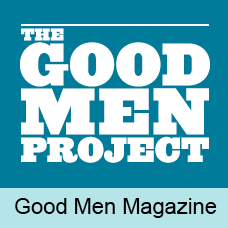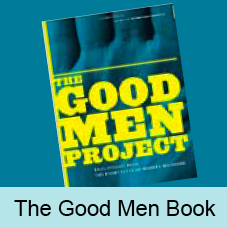Tom Matlack talks to photographer Ron Cowie about enduring love, unspeakable loss and staying present when life falls apart.
Listen to the interview here: RonTomInterview
I had never met Ron Cowie before sitting down with him--and his 5-year-old daughter, Kiki--at a picnic table at Coffee Roasters in Tiverton, Rhode Island. I knew only of his series of haunting photographs, "Leaving Babylon," done shortly before his wife's death.
What drew me to these images, and the good man who made them, was his willingness to embrace loss fully rather than run from it. I think we can all learn from that.
TOM: We've been talking a lot at The Good Men Project about fatherless boys being raised by single moms. Can you talk to me a little bit about being a single dad? What's it like?
RON: I was put into it so quickly. You just wake up and suddenly you've got to read stories and you've got to make breakfast and you've got to ... and the decisions get taken out of it. Under my circumstances, I think more help was offered without a lot of strings attached because people just knew that I was in a whole new situation. It wasn't like a marriage breaking up, where there are people taking sides. It was just, "This is a tragedy."
TOM: Tell me in a few words what your wife was like.
RON: Oh, boy. A few words?
TOM: (Laughs.) Maybe how you met her.
RON: I met her at the photo school, New England School of Photography, where I teach now. But I was a student. I was a first-year student, and my tendency was to always kind of fish off the company pier with relationships.
TOM: (Laughs.)
RON: And she was one of these people where there was a slight interest back and forth.
And I'll never forget the thing that really hooked me. I was saying something to her in a gallery that she was running. And without even turning around, she said, "Ron, some of the things you say I just get embarrassed for you." I'm like, "Ouch." (Laughs.) I'm just embarrassed for you. I was like, Wow! OK.
And I don't know what it was, but I knew that she was the one. I didn't want to screw up. I knew I was in a new chapter of my life, and I also knew I had no emotional preparation for what I needed to be in this relationship; I hadn't been in a relationship like it. But she was patient. She was loving. She taught me how to love.
Really, she was generous enough to teach me how to let me be loved. I think that was the bottom line. It's not like she was a saint and never did anything wrong, or that we didn't have arguments. But she was a very loving, gentle person. That's the best way to describe it and everything kind of came from that. And I think part of her shortcomings was--
KIKI: Daddy?
RON: Yes, Kiki?
KIKI: When am I going to have my bagel and cream cheese?
RON: Oh, when are you going to have your bagel and cream cheese? In a little bit.
KIKI: Okay.
RON: That's being a single parent.
TOM: (Laughs.)
RON: That's what it is.
TOM: When did you get married?
RON: September 9, 2000. I was 30. And it was great. She did a lot of the planning and everything, and it was a good marriage. But I was also learning how to be married. I didn't know how to do that. Kiki, do you want to go up and make an order for a bagel and cream cheese?
KIKI: Daddy.
RON: Twenty dollars makes you less shy. Go. Bring change back.
RON: So, we had to learn how to be ... it's just like anything.
TOM: I've done it twice, so I know.
RON: Yeah.
TOM: (Laughs.)
RON: Well, then, I don't need to tell you anything. I'm going to be doing it twice, too. She died in 2008. In 2007, after we had moved in and Kiki was kind of up and mobile, I realized that a lot of my defenses started coming down.
I was taking pictures that were more personal, and I was able to better appreciate the little things. She would say, "We (Kiki and her) are going for a walk. You want to come?" And my first answer would always be, "You know I have work to do." And then I realized, you know what? This isn't going to last forever. Go.
And I'm really glad I did, because I was able to sort of see, and I took my camera, so it gave me an excuse. And really seeing just what love is, and her interacting with Kiki and sort of realizing that yeah, this is my life, and it's good. It's beautiful. And it's nothing major, nothing grandiose. It was just watching two people interact with each other.
RON: Oh, yeah. Those are the most important things. It's just real simple. And because I always feel like I don't belong anywhere, and when you get to--
KIKI: Here's money. No, it's not mine.
TOM: (Laughs.)
RON: Put it right under the--here. Good. Good. (Laughs.) And yeah, that was--that's precious stuff. I never thought that that would be the most important stuff in my life, but that is. At that time I knew it was important, but...
TOM: So, tell me a little bit about what happened.
RON: Well, she had the flu. She had allergies, the flu and a temperature, and she was in bed for a week. And this is an important thing to pass on--she also had a cough. So it was kind of pneumonia, too, a cough that kept her up. But then all of a sudden, her temperature started going down and she got better. That was on a Saturday. She was feeling a bit better.
And then on Easter Sunday she came downstairs and laid out eggs with Kiki, and then she said, "I'm just going to go back up in bed and rest." I said, "Oh, okay. That's fine." And Sunday night, I slept on the sofa downstairs because she didn't want to keep me up with her coughing. Monday morning, she came down and said, "I really don't feel well at all. I think I want to go to the doctor." She didn't want to go to the doctor before, because she said she didn't want to be a bother.
So Monday we went and got a prescription for Mucilex and Robitussin, and then she had a chest x-ray. When we got back, the doctor had left a message on the machine: "You've got pneumonia. I think we're going to check you in." By the time we got to the emergency room, she was really, really weak. She was in septic shock from bacterial pneumonia. It's where your body can no longer fight off the bacteria, and your organs start to shut down.
She was lucid until she wasn't. She became un-lucid just as the doctors were walking in with the results of the blood test. They said, "Your wife is having a really hard time breathing, so we're going to incubate her right now and help her do that. We have to put her out."
She was really scared. And it was tough, because the last thing she saw me say while she was conscious was, "Everything's going to be all right, and I love you." I can still see her scared face. They did a tracheotomy and she went into cardiac arrest because they couldn't get the tube down her throat--it had swollen shut.
That's when I got up from the room and went outside, and that's when I heard "We don't have a pulse," and CPR was done and they got that back. But then she just--she never woke up. She was in a coma. She went into ICU, and when I was up there, she was just like a rag doll. I think they knew--they said, "Your wife is very, very sick. There's a chance she's not going to make it, and you need to know that."
Finally they told me that there wasn't more I could do there, and that I should go home. They gave me the direct line to the ICU. I woke up at 1:00 a.m., called, no difference. Then I woke up later again. And it was really hitting me, and I just started calling out, "Lisa, you got to fight. Come on." Just begging her, just talking to the ceiling in the bedroom. Fight. Fight, fight, fight, fight. Please. And then I had this vision of her in this blue turtleneck that she wore. (Crying).
I thought she looked beautiful in it all the time. And this vision--it wasn't like I actually saw her. I'm not saying she was there. But I can see it plain as day. Right now I see it. And she was smiling, and now I know it was her telling me it was okay. It was okay. And I said, "I can call now. I can call the ICU." And I did, and when I did, the phone rang and rang and rang. And I knew then that it wasn't good.
When they picked up, the doctor came on. He said, "She's been in cardiac arrest for the past 40 minutes, and we've done everything in this hospital that we can do to keep her alive, but the person you know isn't here anymore and the most helpful thing for everyone would be to stop the code." (Crying.)
And I just said, "Okay." I just--it's like you're on autopilot. I didn't even think twice. And so that's what I did. And my sister and her partner were down, and I went into the guest bedroom and told them. She went into the hospital Monday, and she died Tuesday morning.
TOM: And this was in 2008?
RON: March 25, because it was on one of her best friends' birthdays, too.
TOM: How old was she?
RON: She was--oh, she won't mind that I forget how old she was.
TOM: (Laughs.)
RON: I think she may have been 44, something like that. She will always be 29 to me.
TOM: (Laughs.)
RON: But from that moment, I was never alone in the journey. Never. I called people. I was surrounded by people who had been through exactly what I'd been through. My father-in-law, for one. My priest at my church went through almost exactly what I went through. Two priests--
KIKI: Daddy--
TOM: Nice cream cheese.
RON: Kiki, you are a mess.
TOM: (Laughs.)
RON: Why don't you use that napkin? And it just--it was not easy. There's no way to describe, it and there's no point in describing it.
TOM: So how old was Kiki then?
RON: Kiki was three. It was tough having to explain to her that her mother wasn't coming home. That was a hard conversation.
TOM: What'd you say?
RON: Oh, gosh. I forget. She was over at my sister-in-law's house, just playing. And she was looking down at the trains, playing with them. And I just told her that Mom was sick and really sick. And in a way, that made it that she couldn't come back, and she died. (Crying.)
And she just never looked up. She just kept on playing. And that was it. It's like, Guess what? The thing that kills me, and--I don't want to say killed me--but the thing that hurts the most, and I kept on saying over and over, is that it's just all she wanted to do. I'm a selfish, petty person, and it's not to say that she was a saint. I meant all she wanted to do was be a mom to this little girl. That's it. Like she found her job. She loved it. And the truth being that she doesn't get to do that just seemed so unfair. And I don't have opinions about the afterlife or whatever. I don't know. But I do know that I've got to honor that memory.
TOM: Right.
RON: And it hasn't been a challenge. It hasn't been like, oh I've got to care and feed--
TOM: She's pretty damn cute. (Laughs.)
RON: Yeah. I think I'll keep her. I'm not going to sell her to a gypsy just yet. (Laughs.) But it's a day at a time.
TOM: Yeah.
RON: Day at a time. And I had people call me every day, saying, "How are you feeling?" I don't know. And it's not like you get these monolithic feelings, like I feel sad, I feel happy. It's like I feel really happy and I feel awful that I can feel happy in a world that Lisa's not in. That's how it comes at you.
TOM: Yeah.
RON: And, as you know, I did get engaged. I found someone, or someone was put in my life. I didn't find them. Life moves on, but you can never reconcile it. I'm happy today. There's joy in my life. But I can't say, "Boy, I'm so glad that Lisa died so I can have this joy." That's not how it works. But there is joy, and good things. And it was a day at a time.
KIKI: Daddy?
RON: Yes, Keeks?
KIKI: I'm full of bagel.
RON: All right, you're full of bagel? Well, why don't you wrap it up? You might be able to eat it later. Want more hot chocolate? All right.
KIKI: Can I wash my hands?
RON: Yeah, that might be a good idea. Wash your hands.
TOM: (Laughs.)
RON: It's--I lost my train of thought. But it just kind of--it's hard. It's the worst day of my life.
TOM: Right, right. You were saying that it incrementally grew--
RON: There's not like this bucket of tragedy that just gets dumped on you. It's a drip, and then it just kind of explodes. And I think the thing that kills me is that it's your own best thinking. It was like, Well yeah, she has a 104 degree temperature. I'll check it later on this afternoon, and if it goes down we're okay--
KIKI: Daddy...
RON: Kiki, I'm in the middle of talking. And you know how I like to talk.
TOM: (Laughs.) So how's the experience affected your faith?
RON: Never shook it. I never felt alone. And I think it's expanded it, for sure. It challenged it. But I never stopped believing. It was never about like How could God do this to me?
My priest, who went through this very same thing, said God didn't want Lisa to die. That's not God's plan. How God works is that he always creates a space where good can come out of any tragedy, and that I believe. I don't know what I was thinking that day, but I remember thinking that sometime, very quickly, that good has to come from this.
And I can share this, because of the experiences that we have with sharing experience, strength, and hope. I have to survive this, and good can come out of it, and my job is to look for it, and to be open to it. I think that's what saved me--someone saying, I know exactly what you've been through. And not just one person, but six. I had six men who had lost their wives, who had been through it. And that's a miracle.
TOM: So, how do you talk to Kiki about her mom now?
RON: Whenever she wants to talk about her mom, we just talk about her. And sometimes it's sad. But most times it's good. And I have a lot of her stuff. So when she gets older, she can see it. Lisa kept journals for Kiki of all the things that they did--such a gift. A total, total gift. And I'm so grateful because I don't remember. I could never describe Lisa the way Lisa can speak. It's been a blessing in a strange way.
TOM: How do you think all of this affected your photography?
RON: Oh. Easy. I just stopped. Lisa was such a good photographer, and she was also very noncommercial. She had a commercial brain, but she just couldn't get her head around what she had to do to. I had a show in 2008 in the fall, and I had to shoot for it. And I was trying to figure it out. And I just said, "I don't have the energy. I just don't have the energy to do it."
I'm going to get simple. I'm going to go back and look for beautiful things. And if it pleases me, I'll make a picture of it. So I stopped worrying as much and I stopped... I became myself. I became the photographer.
TOM: So it kind of stripped away the pretension?
RON: Yeah. It blew everything out, every little petty insecurity, because you know what I always fall back on is, someone's on this planet who would love to switch places with me. Like Lisa, if she could, would love to switch places. And there are times where I would love for her to switch places because when you go through something like that, you realize just how hung up on dumb things you can be.
And what matters is being that conduit for the creation. And being a good dad and hoping she's not getting some kind of nasty bacteria right now--
TOM: (Laughs.) As she plays in the puddle over there.
RON: Yeah. Well, she'll be fine.
TOM: Yeah.
RON: I think I've gotten more honest in my work. I've been able to see honesty better. But it's not like you're free of it all. It's like when you go through something--any deep experience like that--you're still who you are. And it's foolish to think, Well I'll never be petty. I'll never get fearful. I'm petty. I'm fearful. I procrastinate. I've got work to do. I realize my work now is more about mortality and spirit and faith.
And it's always been that, but I've just been afraid to talk about that because I'm afraid of what people will think. But I'm realizing more and more that people need to hear that, because I needed to hear that and to experience the support that grew up around me. It's a good reminder that I'm never alone, and there are people out there who've been through that. They feel the way I still feel, and they can help me and I can help them.
TOM: And it's like all this bullshit just kind of falls away.
RON: Yeah. Well, for a while, when I was using my experience quietly to feel superior to everyone--
TOM: (Laughs.)
RON: I would have students who would [say], "Oh I don't know if I can do that. I don't know if I can do that. I always think, You know what? I didn't think I could dig a hole and bury my wife either, but I did that. So shut the fuck up.
TOM: (Laughs.)
RON: Kiki, why don't you be a good girl and put some hand sanitizer on? It'll be fun. It's right over there. It's in the orange thing right by the cash register.
♦♦♦
TOM: We have this little quiz we do. So let's finish up with that.
RON: Okay.
TOM: Who taught you about manhood?
RON: My dad.
TOM: How has romantic love shaped you as a man?
RON: I think it made me a man.
TOM: What two words would you use to describe your dad?
RON: Not to be cliché, but good man.
TOM: How are you most unlike him?
RON: I don't have as many books.
TOM: (Laughs.) From which of your mistakes did you learn the most?
KIKI: Daddy, I finished my hot chocolate.
RON: Good girl.
KIKI: This?
RON: Yeah, hit it.
KIKI: I can't--
RON: Oh, I got to figure out--
KIKI: --open it.
RON: --what my big mistake is.
KIKI: Where's my money?
TOM: Whatever comes to mind first usually is the best thing.
KIKI: Daddy, where's my money?
RON: It's in my pocket so it didn't blow away. All right, there you go, Keeks. You might want to get a straw.
KIKI: Okay.
RON: What did I learn? It's the little things. Don't take little things for granted. Yeah, that's a cliché, but my biggest mistake was not paying attention to the little signposts. And I learned that with Lisa, like, she's really sick. My best thinking is not always correct.
TOM: How would the women in your life describe you, and is it true?
RON: Well, I think they would describe me as a good guy, and yes, it is true.
TOM: Who's the best dad you know and--
RON: Oh, mine.
TOM: What does he do?
RON: Mine. And he's retired.
TOM: (Laughs.) Do you think you've been more successful in your public or private life?
RON: Oh, my private life.
TOM: (Laughs.)
KIKI: I didn't find a straw.
TOM: I think I know the answer to this question. When was the last time you cried?
RON: About 10 minutes ago.
TOM: (Laughs.) What advice would you give teenage boys trying to figure out what it means to be a good man?
RON: Stop fighting anything and anyone.
KIKI: Daddy, I feel like I want to pee.
RON: Okay. Good idea.
TOM: Last question. We're almost done, sweetie. What's your most cherished guy ritual?
RON: My most cherished guy ritual? I don't know if I--I don't think I have any. Mow the lawn. But no that's not--
KIKI: Mow the lawn. (Laughs.)
RON: You should put my number and have people--say, if someone's gone through what I've gone through, they should call me. I will take their call.
Who am I?
I am a photographer.
I teach 19th century photographic processes.
I tell the occasional off color joke.
I bake bread.
I have a dog named Big Joe.
My favorite city is Paris.
Chocolate (really good chocolate) gets inhaled just as fast as Hershey bars.
Reggae music sounds better sober.
Richard Pryor was a genius.
I believe in a compassionate and easily amused God.
Love survives.
(from www.rwcowie.com)
All photos used with permission. All rights reserved. Copyright 2010.




